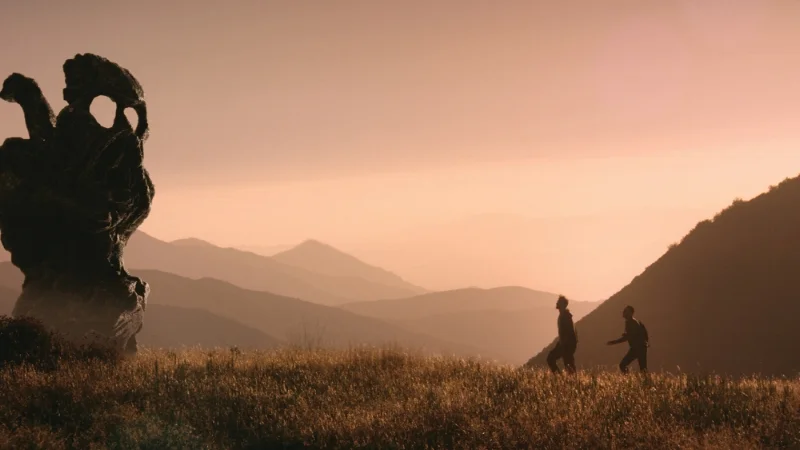THE ENDLESS
Directing: B
Acting: B
Writing: B+
Cinematography: B+
Editing: B+
Special Effects: B
Well, you should be relieved to know that, counter-intuitively, The Endless clocks in at just under two hours. In the wrong hands, even at that length, a title like that could be dangerously provocative. In this case, even after the premise proves a little contrived, the story is consistently compelling.
It's easy to say essentially the same words about a whole bunch of different movies, after you've seen and discussed enough of them. It can take a lot for a movie to stand out. The odd thing about The Endless is that it certainly sets itself apart, but struggles to be especially memorable in the vast ocean of cinema history. Should you rush out and see this in the theatre? "Rush" is a strong word. I mean, I don't regret seeing it.
The best thing with The Endless is not to think too much about the details. It's better if you just go with it. I get hung up on strange details after the fact, like co-directors Justin Benson and Aaron Moorhead playing the lead characters, brothers named . . . Justin and Aaron. According to the credits, in the movie their last name is Smith. Justin Benson, incidentally, wrote the script. This is the third feature film they have made together.
These brothers, as the story begins, receive a camcorder videocassette in the mail. On the tape is a recording of a young woman who was at the "death cult," as they have convinced themselves it was, they left nearly ten years before. Their lives are tedious and teetering on poverty and friendless and without romance, and Aaron convinces Justin to go back to the "commune" for a visit.
It's hardly unpredictable that this cult, which never is given a specific name, is not quite what it seems. Not to us, and not to Justin and Aaron. This extends even to what turns out to be their quite extensive past with this group of people, with is curiously top-heavy with men as opposed to women. I kept wondering about this, whether it was a specific artistic choice or just the common byproduct of casting in most movies. Out of maybe ten key characters, only two of them are women. And antidote to this, particularly when it comes to stories with mystical mysteries, might be revisiting the films written by Brit Marling (Another Earth, Sound of My Voice; she also did the Netflix series The O.A.).
These brothers, anyway, are from San Diego, and presumably the location of the people in this "cult" or mysterious "commune" or whatever you want to call it, is not particularly far from there. The Endless was clearly made on a small budget, and the filmmakers certainly make the most of what little they had. Things get weird in unexpected ways. To a degree, The Endless surprised me with elements of horror. It scared the shit out of me more than once.
What turns out actually to be going on, which is a stretch when it comes to plausibility, fascinates more than it horrifies. Benson and Moorhead use this construct as a device to tell the story of a close and complicated relationship between brothers. The more it focuses on that, the cornier it gets. Even more than when it focuses on the potentially supernatural.
Benson and Moorhead also served as co-producers and co-editors, and, while Benson wrote the script, Moorhead served as cinematographer. Taking on so many more roles than any individual usually does on a given movie production is indeed impressive, and The Endless comes across better in that context. These guys clearly have talent. Sure, it's the kind of talent that tends to stay in the realm of low-budget, independent film, but the stories they tell are well suited to such constraints.
Things aren't as obvious as they seem!
Overall: B


